Tooth Extractions and Bone Preservation

What is bone preservation and why would it be necessary? When a tooth has to be removed, due to either impaction or severe decay, the extraction process leaves a space (socket) where the tooth once existed. The jawbone may be sensitive initially, which is the reason the dentist may suggest bone preservation along with tooth extractions. Protecting the bone after tooth removal is essential for various reasons.
Prevent dry socket
One major purpose of bone preservation is to protect the socket from dryness, which could occur if the blood clot protecting the affected area loosens and exposes the nerves below it. Bone preservation also protects the alveolar ridge, the bit of bone that surrounds the tooth root that they are connected to.
If the alveolar ridge suffers any form of defect, it could create complications if you opt for dental implants. The dental expert has to ensure that the bone has sufficient mass for a potential tooth replacement in the future.
The aim of bone preservation
According to the Journal of the Canadian Dental Association, it is usual for the bone supporting the tooth to dissipate after the tooth is extracted, since it no longer serves its purpose. However, when the bone dissolves, spaces will form between the teeth or the teeth may shift out of place. This is why bone preservation is done immediately after tooth extractions.
The socket or alveolar ridge preservation procedure entails putting a bone graft into the space where the tooth was. The graft can be sourced from synthetic materials or human or animal bone. After placing the bone graft in the socket, the dentist will cover the space with collagen membrane before suturing it to keep it adequately protected.
Why is bone preservation necessary?
Bone preservation aims to enhance the look of the existing teeth and gums and make the dental implant placement procedure easier. Many dentists do not perform the process after tooth removal because they do not think it is a vital or valuable procedure.
This opinion is gradually changing because studies have shown that bone preservation helps lessen horizontal or vertical changes in the alveolar ridge close to the point of tooth extraction. If you are considering the procedure, you should have a proper discussion with your dentist.
Care after extraction
It is important to take adequate care of the surrounding areas of the socket after a tooth extraction. This is not only to protect the gum line but also to increase comfort while the socket heals. The dentist might advise you to avoid brushing for at least a day after the removal.
You should also avoid any action that can place undue pressure on the mouth, including smoking or straw usage, for a while after extraction. Also, avoid hard foods that can shift the blood clot and cause dry socket.
Final note
If you have any questions about the socket created by tooth extraction, before or after a preservation process, do not hesitate to contact your dentist for advice. The dental expert will suggest what to do if you suffer intense pain or excessive bleeding. Tooth extraction and bone preservation are easy procedures, so provided you follow your dentist’s advice, recovery should be fast.
Request an appointment here: https://spectrumsurgical.net or call Facial Spectrum at (816) 524-4334 for an appointment in our Lee's Summit office.
Check out what others are saying about our services on Yelp: Read our Yelp reviews.
Recent Posts
Wisdom teeth removal is necessary for patients whose wisdom teeth are causing problems. Crowding, misalignment, and pain are the common issues that these teeth cause. The dentist will recommend extracting them to prevent more problems from developing. Here are the procedural steps, as well as aftercare tips, that you must consider for wisdom teeth removal.The…
While receiving a referral to a jaw surgeon can raise many questions, our jaw surgeon and team are here to help. We have the professional training and knowledge to ensure patients receive the proper care they need. Our treatment can help address conditions affecting the mouth, jaw, head, neck, and face. We can help determine…
Infections after dental procedures occur frequently and that is primarily due to a lack of education on how to avoid it, however, with the help of an oral surgeon, infections can be avoided in a few ways. Oral surgeons are dental professionals who focus on invasive procedures that are necessary in order to treat or…
Your facial surgeon will prepare you well before your jaw surgery. This invasive procedure can improve your appearance and relieve your pain. It can also enhance your dental health. Here are the important details that your facial surgeon would want you to know before your jaw surgery.The upper and lower jaws are important in completing…


